Place food scraps in a compostable bag, paper bag, or other kinds of compostable container prior to placing them in your organics cart. We accept all food scraps, soiled paper, and plants in the brown organics cart. Only bio-plastics labeled “compostable” and displaying a green or brown stripe may be placed in the organics cart. Contact us to change the size of any of your carts.
| Acceptable Organics/Compostable Materials |
|
Unacceptable Materials
|
Food Scraps
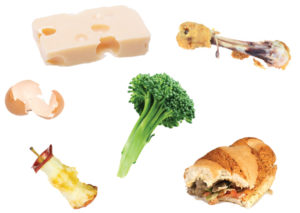
- Bread, grains, and pasta
- Coffee grounds and paper filters
- Dairy
- Eggshells and eggs
- Fruit (pits & peels)
- Leftovers and spoiled food
- Meat (including bones)
- Seafood (including shellfish)
- Tea and tea bags
- Vegetables
Food Soiled Paper
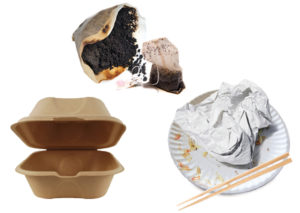
- Coffee filters
- Greasy pizza boxes
- Paper plates
- Paper bags, napkins, tissues, and towels
- Paper take-out boxes and containers (metal handle OK)
- Milk/juice cartons
- Tissues
|
Plants
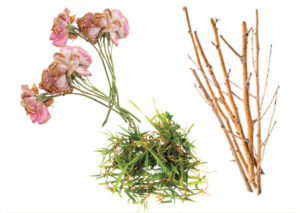
- Branches and brush
- Flowers and floral trimmings
- Grasses and weeds
- Palm fronds
- Leaves
- Tree trimmings (less than 8 inches in diameter and cut to fit in your cart)
- Christmas trees (cut in half or multiple pieces)
- Excess leaves and prunings from trees and brush (up to 8 inches in diameter) can be placed in yard material piles on certain days.
Other
- Cotton balls and cotton swabs
- Hair, fur, and feathers (non-synthetic)
- Compostable plastics and biodegradable plastics (i.e.green stripe, BPI certified, PLA, etc.)
- Waxed cardboard
- Wood – small pieces of lumber or sawdust from clean wood only
- Wooden chopsticks
- Corks – natural
- Domestic bird, reptile, and bunny droppings
- Newspaper lining from bird
- Small amounts of sod (cannot exceed the weight limit on the carts: 300 lbs for 95-gallon carts, 220 lbs for 65-gallon carts, and 125 lbs for 35-gallon carts)
|
|
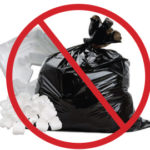 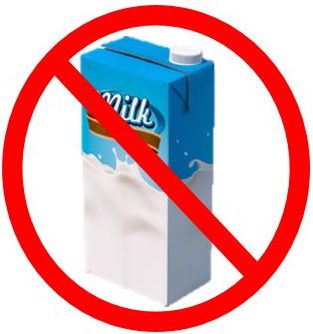
- Aluminum foil or trays
- Shelf stable cartons
- Cat litter or animal feces
- Compostable diapers
- Ceramic dishware or glassware
- Clothing, linens, and rags
- Liquid, fats, oils, and grease
- Corks – plastic
- Diapers
- Dirt, rocks, or stone
- Flower pots or trays
- Foil-backed or plastic-backed paper
- Glass, metal, or plastic not labeled “Compostable” or “Biodegradable”
- Liquids or ice
- Plastic bags, wrappers, or film
- Recyclable/clean cardboard or paper
- Polystyrene foam
- Wood – plywood, pressboard, painted or stained wood
- Dead animals
|
Do You Have Extra Yard Trimmings?
Learn more about seasonal yard material pile collection beginning in October.
Each residential curbside recycling cart has two separate compartments. The label on the lid explains what can be placed inside each of the cart’s compartments. Place paper and small cardboard pieces in the side with the black lid, and place plastic, aluminum, glass bottles, and cans in the side with the blue lid. If you have a lot of cardboard boxes, please flatten and place them next to your carts.
Recycling must be loose, free of a plastic bag liner.
| Acceptable Recycling Materials |
|
Unacceptable Recycling Materials |
Metal (no liquids or food):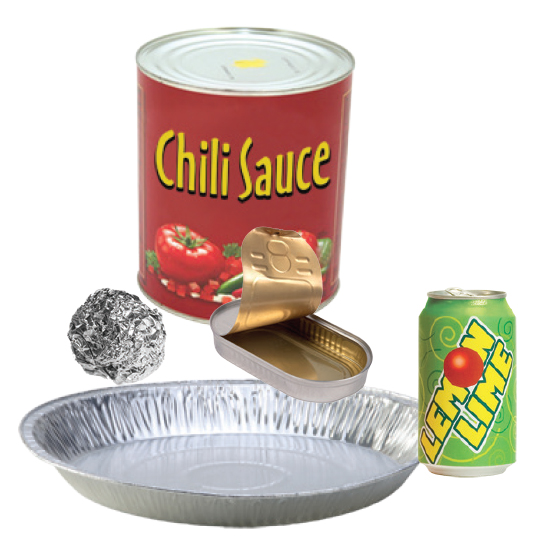
- Aluminum cans
- Tin/steel cans
- Aluminum foil
- Empty aerosol cans
- Empty paint cans
- Foil pie plates
- Metal lids and caps
Plastics: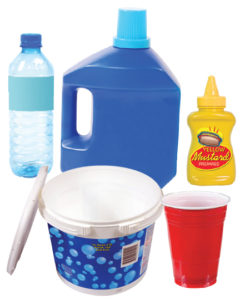
- All #1, #2, #3, #4, #5, #6, and #7 rigid plastics
- Any plastic container with a #1, #2, #3, #5, #6 or #7 recycling symbol
- Plastic caps & lids
- Plastic toys
- Laundry baskets
- Plastic crates
- Plastic buckets*
- Plastic flower pots
- Plastic nursery trays
- Plastic containers
- Children’s outdoor plastic toys (sandboxes, slides, play kitchens)*
- CD and DVD cases
- Clean PVC pipe (no dirt)
- Plastic furniture*
* These items may be too large to fit in the recycling cart—the lid must be able to close. Please take these to the recycling center at 2727 2nd Street for free recycling drop-off 24/7.
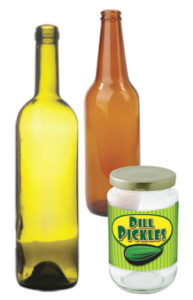 Glass (no liquids or food): Glass (no liquids or food):
- Glass food jars
- Glass beer bottles
- Glass wine bottles
- Glass beverage bottles
- All colors of glass are OK
|
|
Paper (clean, dry, and unsoiled):
- Shoe boxes
- Gift boxes
- Cardboard
- Computer paper
- Notebook paper
- Paper bags
- Paper towel tubes
- Toilet paper tubes
- Junk mail
- Magazines
- Catalogs
- Paper folders
- Shredded paper (place in a paper bag to prevent litter)
- Staples are OK in paper, but please remove paper clips and clasps
- Clean pizza boxes (no cheese or grease)
- Phone books
- Office paper
- Newspaper
- Wrapping paper
- Cereal & other paperboard boxes
- Egg cartons
- Small pieces of cardboard: place in the cart
- Large pieces of cardboard: remove all packing material, flatten, and stack on the ground next to the recycling cart, or place in the cardboard recycling bin (if present)
- Paperback books
- Hardback Books — remove bindings first (place in trash) and recycle the pages only
|
|
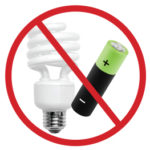 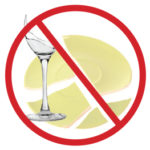 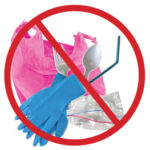 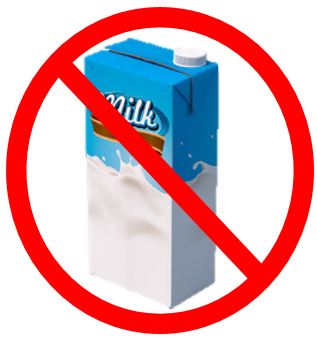
- Plastic Bags – grocery bags, produce bags, resealable food storage bags, plastic food wrap, shrink wrap, and other miscellaneous plastic wraps, cannot be placed in the recycling cart.
- Packing foam & polystyrene packing peanuts – some shipping and packing stores may accept them for reuse.
- Shelf stable cartons
- Plastic labeled “Compostable” or “Biodegradable”
- Auto glass
- Ceramics
- Fluorescent light bulbs & tubes
- Incandescent light bulbs
- Mirrors
- Window glass
- Pyrex dishes
- Porcelain
- Wine glasses
- Hoses
- Rubber tires
- Dishes, plates, bowls & glasses
- Scrap Metal
- Expanded polystyrene (a.k.a. StyrofoamTM Brand Foam)
- Contaminated plastics—items covered in dirt, food, or other materials.
- Electronics
|
Few things, once they are used, are actually considered garbage. Among such things are non-recyclable plastics and other complex materials that were not designed to be recycled.
| Acceptable Garbage Materials |
|
Unacceptable Trash Materials
|
- Cat litter and animal feces (bagged)
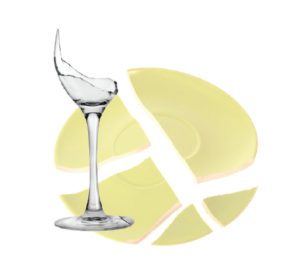 Broken dishware or glassware Broken dishware or glassware- Ceramics
- Cigarette Butts (extinguished – run under water prior to disposal)
- Coffee pods (Keurig k cups)
- Candy wrappers
- Dead animals (under 10 pounds, bagged)
- Diapers and other sanitary products
- Disposable gloves
- Drink pouches
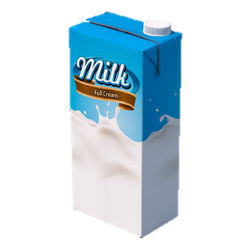 Juice boxes and other shelf-stable cartons Juice boxes and other shelf-stable cartons
|
- Mylar (shiny metal) bags
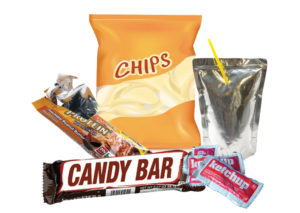 (potato chips, candy bars, balloons, etc) (potato chips, candy bars, balloons, etc)
- Pens and pencils
- Plastic items mixed with metal or rubber
- Porcelain
- Polystyrene foam
- Plastic film
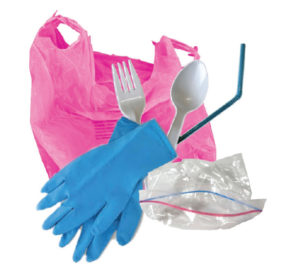
- Plastic bags
- Rubber bands
- Six-pack ring holder – please cut up
- Sponges
- Styrofoam
- Twist ties
- Thermal receipts
- Wood – small pieces of plywood, pressboard, and painted or stained wood
|
|
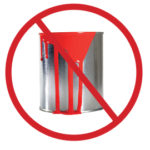 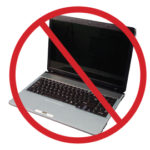 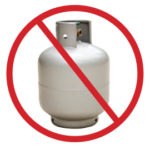
- Appliances
- Asbestos
- Batteries
- Coat hangers
- Construction debris
- Cooking oil and grease
- Dirt, rocks, or stone
- Electronics
- Fluorescent or HID light bulbs
- Food scraps, soiled paper, or yard trimmings
- Household hazardous waste
- Large items (furniture, metal, plastic, wood)
- Liquids or ice
- Motor oil
- Needles or syringes
- Paint
- Recyclable cardboard, glass, metal, paper, or plastic
- Toys with electronics or batteries
- Waxed cardboard and paper
|
Do You Have Extra Trash?
If you have extra trash that does not fit in your cart, please contact us.
Hazardous & electronic waste accounts for significant amounts of toxic waste in landfills. Items such as electronics, fluorescent bulbs and tubes, paints, pesticides, cleaning products, old medications, and other chemicals are illegal to put in the garbage or pour down a drain or gutter because they contaminate our soil, drinking water, and air.
Examples of Hazardous waste: Aerosol cans, antifreeze, batteries, bleach, chlorine, cooking oil, fluorescent lamps, garden chemicals, gasoline, household cleaners, hydraulic fluid, insect sprays, mercury waste, motor oil, oily rags, paint products, pool chemicals, sharps in containers, thermometers, tile cleaners, tile remover, transmission fluid, used oil filters, medications.
Examples of Universal & Electronic waste: Batteries, fluorescent bulbs, computers, monitors, cords, phones, TVs, VCRs, DVD players, stereos, microwave ovens, or iPods.
DROP OFF
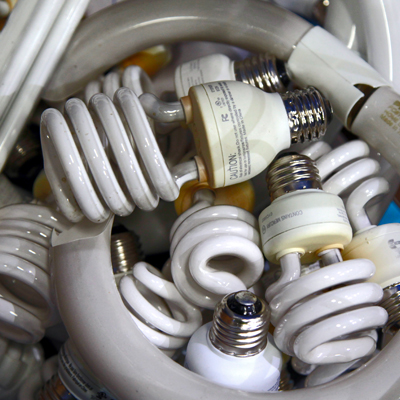 Residents: Yolo County residents can bring their hazardous waste, electronics, and universal waste to the household hazardous waste (HHW) Drop-Off Days at the Yolo County Central Landfill for free every Friday and Saturday from 7:30 am – 3:30 pm View detailed drop off information here. For universal waste, such as microwaves and small appliances, residents may donate them to Goodwill.
Residents: Yolo County residents can bring their hazardous waste, electronics, and universal waste to the household hazardous waste (HHW) Drop-Off Days at the Yolo County Central Landfill for free every Friday and Saturday from 7:30 am – 3:30 pm View detailed drop off information here. For universal waste, such as microwaves and small appliances, residents may donate them to Goodwill.
 UC Davis campus residents: UC Davis operates a separate household hazardous waste collection program. Thus, residents on campus are NOT eligible to bring HHW materials to the Yolo County landfill for disposal. For information about on-campus disposal, please visit UC Davis Zero Waste.
UC Davis campus residents: UC Davis operates a separate household hazardous waste collection program. Thus, residents on campus are NOT eligible to bring HHW materials to the Yolo County landfill for disposal. For information about on-campus disposal, please visit UC Davis Zero Waste.
Businesses: Businesses can dispose of their materials through Yolo County’s Conditionally Exempt Small Quantity Generator Program at the Yolo County Central Landfill.
Motor oil & filters: City of Davis customers may drop off used motor oil (in tightly secured containers) and oil filters at the Davis Recycling Center at no charge. For more drop-off options, visit the City of Davis motor oil page.
For information about Bulky Item Drop Off Days and curbside collection, visit the
Bulky Items page.



 Residents: Yolo County residents can bring their hazardous waste, electronics, and universal waste to the household hazardous waste (HHW) Drop-Off Days at the Yolo County Central Landfill for free every Friday and Saturday from 7:30 am – 3:30 pm View detailed drop off information here. For universal waste, such as microwaves and small appliances, residents may donate them to Goodwill.
Residents: Yolo County residents can bring their hazardous waste, electronics, and universal waste to the household hazardous waste (HHW) Drop-Off Days at the Yolo County Central Landfill for free every Friday and Saturday from 7:30 am – 3:30 pm View detailed drop off information here. For universal waste, such as microwaves and small appliances, residents may donate them to Goodwill. UC Davis campus residents: UC Davis operates a separate household hazardous waste collection program. Thus, residents on campus are NOT eligible to bring HHW materials to the Yolo County landfill for disposal. For information about on-campus disposal, please visit UC Davis Zero Waste.
UC Davis campus residents: UC Davis operates a separate household hazardous waste collection program. Thus, residents on campus are NOT eligible to bring HHW materials to the Yolo County landfill for disposal. For information about on-campus disposal, please visit UC Davis Zero Waste.








 Broken
Broken




